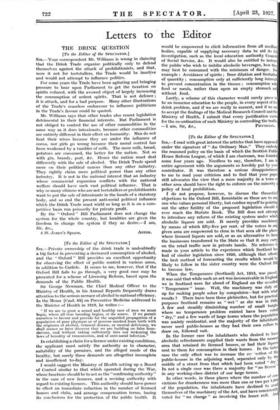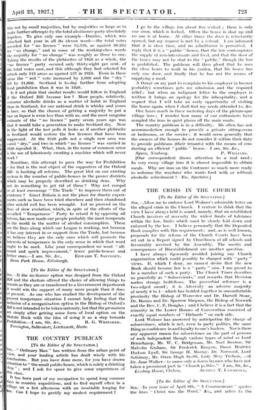[To the Editor of the SPECTATOR.]
SIR,—I read with great interest the articles that have appeared under the signature of " An Ordinary Man." They embody the reasoned policy on the basis of which the Scottish Public House Reform League, of which I am chairman, was founded some four years ago. Needless to say, therefore, I am in entire agreement with the arguments so forcibly put by your contributor. It was therefore a serious disappointment to me to read your criticism and to find that your paper still advocates the view that a mere majority in a town or other area should have the right to enforce on the minority a policy of local prohibition.
I do not propose, however, to discuss the theoretical objections to the Oxford Bill, formidable as these are to any one who values personal liberty, but confine myself to pointing out the utter futility of the proposed legislation should it ever reach the Statute Book. The Bill does not attempt to introduce any reform of the existing system under which alcoholic liquors are sold. It merely provides machinery by means of which fifty-five per cent. of the voters in any given area are empowered to close in that area all the places where licensed liquors are sold, or as an alternative to have the businesses transferred to the State so that it may carry on the retail traffic now in private hands. No reference is made in your article to the experience which Scotland has had of similar legislation since 1920, although that affords the best method of forecasting the results which would be likely to follow in the sister country were the Oxford Bill to become law.
When the Temperance (Scotland) Act, 1913, was passed, it was said that while such an act was inconceivable in England we in Scotland were far ahead of England on the so-called " Temperance " issue. Well, the machinery was duly set up for making people sober by compulsion—but with what results ? There have been three plebiscites, but for practical purposes Scotland remains as " wet " as she was in 1920. A few and steadily diminishing number of small burghs where no temperance problem existed have been voted " dry," and a few wards of large towns where the population was mainly residential, and the majority of the inhabitants never used public-houses as they had their own cellars to draw on, followed suit. In the former case the inhabitants who desired to have alcoholic refreshments supplied their wants from the nearest area that retained its licensed houses, or had their liquors sent to them for consumption in their homes. In the latter case the only effect was to increase the co- -estion of the public-houses in the adjoining ward, separated only by the middle of a street from that which had been voted " dry In not a single case was there a majority for " no licence in any working-class district of our large -towns.
In other words, in those places where the number of con'
victions for drunkenness was more than one or two per 1P00 of the population, the inhabitants have declined to avail themselves of the machinery of the Act, and have consistently. voted for " no change " as involving the lesser evil. And
0 ie
Is -d :t Cr
sr
a al
ry
it
Cldt
es
is
rs Is ie
this not by small majorities, but by majorities so large as to make further attempts by the total abstinence party absolutely hopeless. To give only one example—Dundee, which was attacked last year in all its eleven wards—the total votes recorded for " no licence " were 12,336, as against 30,292 for " no change," and• in some of the working-class wards the majority for " no change " was roughly as three to one. Taking the results of the plebiscites of 1926 as a whole, the no licence " party secured only thirty-eight per. cent: of the total votes cast, and this although they had selected Tor attack only 113 areas as against 257 in 1923. Even in these areas the " wet " vote increased by 2,000 and the " dry fell by 11,000. Scotland is to-day further from" adopting local prohibition than it was in 1920.
Is it not plain that similar results would follow in England if the Oxford Bill became law ? More people, relatively, consume alcoholic drinks as a matter of habit in England than in Scotland, for our national drink is whisky and yoirrs is beer, so that the chance of getting a majority to put a ban on liquor is even less than with us, and the most sanguine estimate of the " no licence " party seven years ago was that it would take a generation to make Scotland dry. Now in the light of the last polls it looks as if another plebiscite in Scotland would restore the few licences that have been suppressed. At the 1926 polls not a single new area was voted " dry," and two in which " no licence " was carried in 1920 repealed it. What, then, in the name of common sense is the use of laboriously creating a machine which will never work ?
Meantime, this attempt to pave the way for Prohibition —for that is the real object of the supporters of the Oxford Bill—is burking all reforms. The great blot on our existing system is the number of public-houses in the poorer districts which may be properly described as drinking dens. Why not do something to get rid of these ? Why not compel or at least encourage " The Trade " to improve them out of existence ? Great Britain is not the place for drastic experi- ments such as have been tried elsewhere and then abandoned after untold evil has been wrought. Let us proceed on the lines of slow evolution, which, in spite of the efforts of the so-called " Temperance " Party to retard it by opposing all reform, has now made our people probably the most temperate in the world in the matter of alcohol consumption. These are the lines along which our League is working, not because it has any interest in or support from the Trade, but because we believe they are the only ones which will promote the interests of temperance in the only sense in which that word ought to be used. Like your correspondent we want " all- round and quick improvement," fewer. public-houses and better ones.—I am, Sir, &c., EDWARD T. SALVESEN. Dean Park House, Edinburgh.











































 Previous page
Previous page